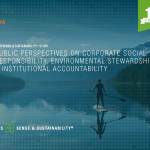Key Messages:
- The 2019 Sense & Sustainability® Study published by G&S Business Communications is the firm’s 10th annual U.S. public opinion poll about the business commitment to protecting society and the environment.
- In increasing numbers, consumers say they are likely to favor companies with suppliers that comply with human rights or compensation laws (76%) and fair wages to retain top employees (74%).
- Most Americans correlate local jobs creation (55%) and nature conservation (52%) with a favorable business reputation for sustainability, defined as corporate social and environmental responsibility.
NEW YORK–(BUSINESS WIRE)–Public sentiment has intensified about the ways businesses can take purposeful action in helping people, communities and the environment to thrive, according to the 10th annual Sense & Sustainability Study, released today by G&S Business Communications (G&S). The opinion poll was conducted online by YouGov Plc for G&S in August 2019 among 1,330 U.S. adults. Key findings include:
- There are sharp increases in consumers’ likelihood to purchase from companies whose suppliers comply with human rights or compensation laws (76%, up from 68% in 2018) and businesses offering fair wages to retain top employees (74%, up from 68% in 2018).
- Most Americans view the creation of local jobs (55%) and conservation of natural resources (52%) as helpful in forming a positive business reputation for social and environmental responsibility.
- In ranking certain groups for their roles in protecting society and nature throughout the supply chain, Americans assign the greatest responsibility to the general public (52%). The government is the second-most frequently cited, but at a significantly lower rate than last year (49%, down from 55% in 2018).
- Six in 10 believe bad news tends to dim good news in green business coverage. Strikingly, more than half of survey takers (59%) are either unsure of corporate efforts to share news about improving the environment and society, or believe that companies are doing a poor job communicating it.
“People are voicing a desire to end the numbing grind of thoughts, prayers and partisan bickering driving today’s conversations about our environment, communities and households,” said Ron Loch, G&S managing director and sustainability consulting leader. “Instead of allowing misguided actors to exploit a gap in knowledge, communicators can re-energize public discourse to become more purposeful. Business communicators know how to link evidence with empathy to turn data about corporate social responsibility into meaningful stories of human connectedness, innovation and action.”
“Based on our decade-long G&S research, the narrative arc for the corporate responsibility movement has shifted from doing good on a global scale to working ambitiously at the human scale,” said Mary C. Buhay, G&S senior vice president, marketing, and lead author of the Sense & Sustainability Study. “We are seeing the public’s growing sense of accountability and agency about their own impact on nature and society, which includes their beliefs about human-caused climate change and their choices as consumers, employees, investors and private citizens. As people look for tangible, incremental results, there is a clear opportunity for businesses and their leaders to step up and demonstrate they are behaving ethically, operating responsibly and offering workable answers.”
For the 10th edition of the Sense & Sustainability Study, G&S selected two industries—healthcare, and home and building—as focal points to gauge U.S. attitudes about the benefits of sustainability practices and green products, for both individuals and communities.
Healthcare or Health Technologies
In considering healthcare industry solutions with sustainability benefits for both communities and their own households, Americans are more likely to recognize the greater good.
- Many Americans say healthtech solutions that eliminate travel, which also reduce fuel consumption and greenhouse gas emissions, benefit both their daily lives and their communities (both at 38%). Nutrition and wellness education about diets consisting of low carbon-impact ingredients has a similarly positive effect, both on a personal level (40%) and at the community level (39%).
- U.S. adults see healthcare institutions that adopt eco-friendly practices as having a more favorable impact on their local communities (45%) versus their daily lives (39%).
- More choose none of the options offered for health-focused solutions when thinking about the positive difference made in their daily lives (26%) as opposed to local communities (22%), revealing a potential opportunity for the healthcare industry to provide more education about its green practices.
- Fifty-eight percent believe the news media is inclined to report bad news more than good news in green business coverage about healthcare companies. However, most (60%) are either unsure of the industry’s own communications about best sustainability practices, or believe it does not do a good job communicating them.
Home and Building Solutions
Home and building solutions that address environmental protection and climate resilience represent distinct benefits for Americans in their personal lives, communities or both.
- Renewable energy, such as solar power, is a home and building technology seen as dually improving daily lives (40%) and local communities (39%).
- Americans say energy-efficient appliances have a more positive effect on their households (47%) in comparison to their community (31%).
- When considering waste management systems that safely dispose of materials, including bio-waste and recyclables, more recognize the favorable impact on their neighborhoods (50%) versus their own lives (39%).
- Fifty-seven percent believe there is a tendency to report bad news more than good news in green business coverage about home and building companies. However, most (59%) are either unsure of the industry’s efforts to communicate its own responsible and ethical actions, or view its communications as lacking.
To obtain a report with details of the 2019 G&S Sense & Sustainability® Study, along with a 10th edition infographic that highlights key findings from the study’s history, please visit the company’s website.
G&S is a global business communications firm with expertise in corporate social responsibility (CSR), sustainability, and environmental, social and governance (ESG) impact for clients in key markets: Advanced manufacturing and energy, agribusiness and food, clean technology, emerging technology ventures, financial and professional services, healthcare, home and building solutions, and nutrition and wellness. G&S was honored as the B2B/Corporate Agency of the Year by the Holmes Report and named multiple times to the CSR Agency A-List by PR News.
About G&S Business Communications
G&S Business Communications is an independent, fully integrated marketing and public relations firm with headquarters in New York and offices in Chicago, Raleigh, N.C., and Basel, Switzerland. The firm’s global network extends across more than 50 countries through its PROI Worldwide partnership. G&S integrates business and communications strategies, using a full range of communications services, to build sustainable relationships for clients along the entire value chain. We inspire action that drives results. For more information, please visit www.gscommunications.com.
About the G&S Sense & Sustainability® Study
The 2019 G&S Sense & Sustainability Study is the firm’s tenth annual survey of U.S. adults about business efforts to improve society and the environment through sustainable practices, products, or services. The survey was fielded online on behalf of G&S by YouGov Plc between August 5 and 6, 2019 among 1,330 U.S. adults ages 18 and older. All figures are weighted and are representative of all U.S. adults ages 18 and older. For more information about Sense & Sustainability studies published from 2010-2018, please visit the company website.
No estimate of theoretical sampling error can be calculated. For complete survey methodology, including weighting variables, please contact Mary C. Buhay.
Contacts
Mary C. Buhay
G&S Business Communications
(212) 697-2600
mbuhay@gscommunications.com



